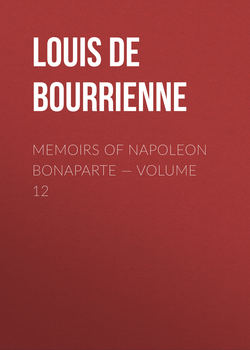Memoirs of Napoleon Bonaparte — Volume 12

Реклама. ООО «ЛитРес», ИНН: 7719571260.
Оглавление
Louis de Bourrienne. Memoirs of Napoleon Bonaparte — Volume 12
CHAPTER XXVIII
CHAPTER XXIX
CHAPTER XXX
CHAPTER XXXI
CHAPTER XXXII
CHAPTER XXXIII
CHAPTER XXXIV
CHAPTER, XXXV
CHAPTER XXXVI
Отрывок из книги
On the 2d of May Napoleon won the battle of Lutzen. A week after he was at Dresden, not as on his departure for the Russian campaign, like the Sovereign of the West surrounded by his mighty vassals: he was now in the capital of the only one of the monarchs of his creation who remained faithful to the French cause, and whose good faith eventually cost him half his dominions. The Emperor stayed only ten days in Dresden, and then went in pursuit of the Russian army, which he came up with on the 19th, at Bautzen. This battle, which was followed on the two succeeding days by the battles of Wurtchen and Oclikirchen, may be said to have lasted three days—a sufficient proof that it was obstinately disputed. It ended in favour of Napoleon, but he and France paid dearly for it: while General Kirschner and Duroc were talking together the former was killed by a cannon-ball, which mortally wounded the latter in the abdomen.
The moment had now arrived for Austria to prove whether or not she. intended entirely to desert the cause of Napoleon.
.....
I will here mention a fact which occurred before Duroc's departure for the campaign of 1812. I used often to visit him at the Pavilion Marsan, in the Tuileries, where he lodged. One forenoon, when I had been waiting for him a few minutes, he came from the Emperor's apartments, where he had been engaged in the usual business, He was in his court-dress. As soon as he entered he pulled off his coat and hat and laid them aside. "I have just had a conversation with the Emperor about you," said he. "Say nothing to anybody. Have patience, and you will be—" He had, no sooner uttered these words than a footman entered to inform him that the Emperor, wished to see him immediately. "Well," said Duroc, "I must go." No sooner was the servant gone than Duroc stamped violently on the floor, and exclaimed, "That ——- ——- never leaves me a moment's rest. If he finds I have five minutes to myself in the course of the morning he is sure to send for me." He then put on his coat and returned to the Emperor, saying, "Another time you shall hear what I have to tell you."
From that time I did not see Duroc until, the month of January 1813. He was constantly absent from Paris, and did not return until the end of 1812. He was much affected at the, result of the campaign, but his confidence in Napoleon's genius kept up his spirits. I turned the conversation from this subject and reminded him of his promise to tell me what had passed between the Emperor and himself relative tome. "You shall hear," said he. "The Emperor and I had been playing at billiards, and, between ourselves, he plays very badly. He is nothing at a game which depends on skill. While negligently rolling his balls about he muttered these words: 'Do you ever see Bourrienne now?'—'Yes, Sire, he sometimes dines with me on diplomatic reception-days, and he looks so droll in his old-fashioned court-dress, of Lyons manufacture, that you would laugh if you saw him.'—'What does he say respecting the new regulation for the court-dresses?'—'I confess he says it is very ridiculous; that it will have no other result than to enable the Lyons manufacturers to get rid of their old-fashioned goods; that forced innovations on the customs of a nation are never successful.'—'Oh, that is always the way with Bourrienne; he is never pleased with anything.'— 'Certainly, Sire, he is apt to grumble; but he says what he thinks.'— 'Do you know, Duroc, he served me very well at Hamburg. He raised a good deal of money for me. He is a man who understands business. I will not leave him unemployed. Time must hang heavily on his hands. I will see what I can do for him. He has many enemies.'—`And who has not, Sire?'— 'Many complaints against him were transmitted to me from Hamburg, but the letter which he wrote to me in his justification opened my eyes, and I begin to think that Savary had good motives for defending him. Endeavours are made to dissuade me from employing him, but I shall nevertheless do so at last. I remember that it was he who first informed me of the near approach of the war which we are now engaged in. I forget all that has been said against him for the last two years, and as soon as peace is concluded, and I am at leisure, I will think of him.'"
.....